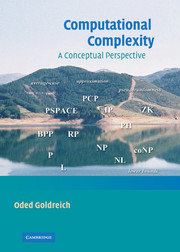Book contents
- Frontmatter
- Contents
- List of Figures
- Preface
- Organization and Chapter Summaries
- Acknowledgments
- 1 Introduction and Preliminaries
- 2 P, NP, and NP-Completeness
- 3 Variations on P and NP
- 4 More Resources, More Power?
- 5 Space Complexity
- 6 Randomness and Counting
- 7 The Bright Side of Hardness
- 8 Pseudorandom Generators
- 9 Probabilistic Proof Systems
- 10 Relaxing the Requirements
- Epilogue
- Appendix A Glossary of Complexity Classes
- Appendix B On the Quest for Lower Bounds
- Appendix C On the Foundations of Modern Cryptography
- Appendix D Probabilistic Preliminaries and Advanced Topics in Randomization
- Appendix E Explicit Constructions
- Appendix F Some Omitted Proofs
- Appendix G Some Computational Problems
- Bibliography
- Index
7 - The Bright Side of Hardness
Published online by Cambridge University Press: 05 June 2012
- Frontmatter
- Contents
- List of Figures
- Preface
- Organization and Chapter Summaries
- Acknowledgments
- 1 Introduction and Preliminaries
- 2 P, NP, and NP-Completeness
- 3 Variations on P and NP
- 4 More Resources, More Power?
- 5 Space Complexity
- 6 Randomness and Counting
- 7 The Bright Side of Hardness
- 8 Pseudorandom Generators
- 9 Probabilistic Proof Systems
- 10 Relaxing the Requirements
- Epilogue
- Appendix A Glossary of Complexity Classes
- Appendix B On the Quest for Lower Bounds
- Appendix C On the Foundations of Modern Cryptography
- Appendix D Probabilistic Preliminaries and Advanced Topics in Randomization
- Appendix E Explicit Constructions
- Appendix F Some Omitted Proofs
- Appendix G Some Computational Problems
- Bibliography
- Index
Summary
So saying she donned her beautiful, glittering golden–Ambrosial sandals, which carry her flying like the wind over the vast land and sea; she grasped the redoubtable bronze-shod spear, so stout and sturdy and strong, wherewith she quells the ranks of heroes who have displeased her, the [bright-eyed] daughter of her mighty father.
Homer, Odyssey, 1:96–101The existence of natural computational problems that are (or seem to be) infeasible to solve is usually perceived as bad news, because it means that we cannot do things we wish to do. But this bad news has a positive side, because hard problems can be “put to work” to our benefit, most notably in cryptography.
It seems that utilizing hard problems requires the ability to efficiently generate hard instances, which is not guaranteed by the notion of worst-case hardness. In other words, we refer to the gap between “occasional” hardness (e.g., worst-case hardness or mild averagecase hardness) and “typical” hardness (with respect to some tractable distribution). Much of the current chapter is devoted to bridging this gap, which is known by the term hardness amplification. The actual applications of typical hardness are presented in Chapter 8 and Appendix C.
Summary: We consider two conjectures that are related to P ≠ NP. The first conjecture is that there are problems that are solvable in exponential time (i.e., in ε) but are not solvable by (non-uniform) families of small (say, polynomial-size) circuits. […]
Information
- Type
- Chapter
- Information
- Computational ComplexityA Conceptual Perspective, pp. 241 - 283Publisher: Cambridge University PressPrint publication year: 2008
